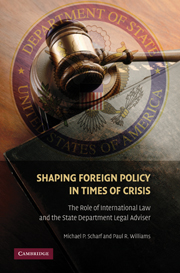 Shaping Foreign Policy in Times of Crisis
Shaping Foreign Policy in Times of Crisis Published online by Cambridge University Press: 05 June 2012
WHEN I MOVED TO THE STATE DEPARTMENT WITH SECretary Rice in 2005, first as Senior Adviser and ultimately as Legal Adviser, I was deeply concerned by international (and domestic) perceptions that the Bush Administration not only did not believe in international law but was actively hostile toward it. These perceptions had been fueled by various Bush Administration actions in the first term, including the renunciation of the Kyoto Protocol, the “un-signing” of the Rome Statute, opinions on extraordinary interrogation techniques issued by the Department of Justice, and, perhaps most significant, the decision to invade Iraq without a new UN Security Council Resolution authorizing the use of force. Throughout my tenure as Legal Adviser, one of my main goals was to rebut these perceptions, both by trying to ensure compliance with our international obligations in the Bush Administration's second term and by engaging in active “international legal diplomacy” with other countries and international institutions.
From her earliest days as Secretary of State, Secretary Rice supported my mission in both words and actions. In a town hall meeting of State Department employees during her first week in office, she stated, in an unscripted response to a question from a young L attorney, that “This Department, along with the rest of the Bush Administration, will be a strong voice for international legal norms, for living up to our treaty obligations, to recognizing that America's moral authority in international politics also rests on our ability to defend international laws and treaties.”
To save this book to your Kindle, first ensure no-reply@cambridge.org is added to your Approved Personal Document E-mail List under your Personal Document Settings on the Manage Your Content and Devices page of your Amazon account. Then enter the ‘name’ part of your Kindle email address below. Find out more about saving to your Kindle.
Note you can select to save to either the @free.kindle.com or @kindle.com variations. ‘@free.kindle.com’ emails are free but can only be saved to your device when it is connected to wi-fi. ‘@kindle.com’ emails can be delivered even when you are not connected to wi-fi, but note that service fees apply.
Find out more about the Kindle Personal Document Service.
To save content items to your account, please confirm that you agree to abide by our usage policies. If this is the first time you use this feature, you will be asked to authorise Cambridge Core to connect with your account. Find out more about saving content to Dropbox.
To save content items to your account, please confirm that you agree to abide by our usage policies. If this is the first time you use this feature, you will be asked to authorise Cambridge Core to connect with your account. Find out more about saving content to Google Drive.